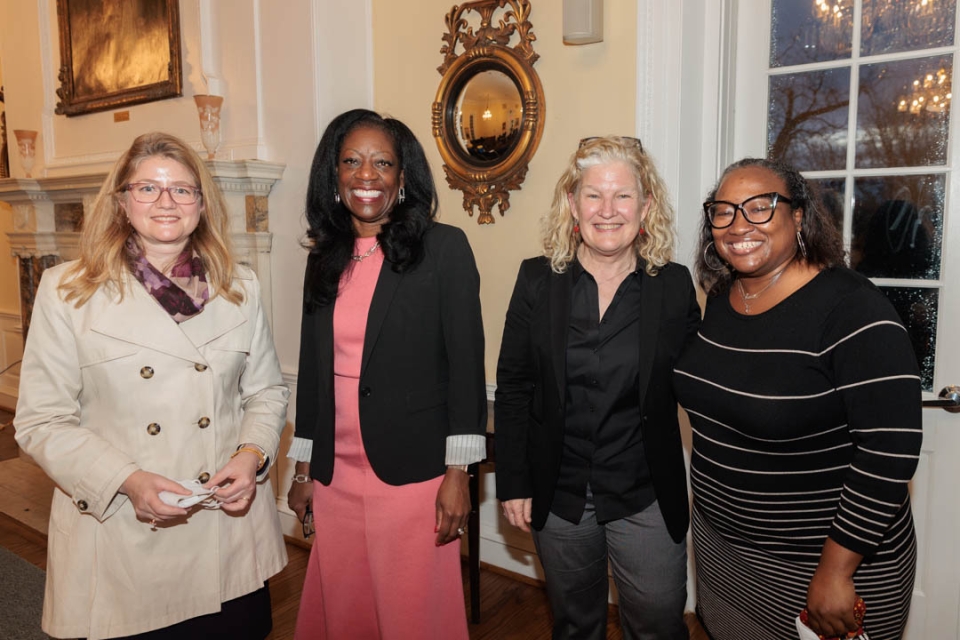Originally published on GWToday. April 11, 2022. By B.L. Wilson
The symposium hosted by the George Washington University Women’s Leadership Program on the Mount Vernon campus Thursday evening convened just after federal appellate Judge Kentanji Brown Jackson was confirmed by the United States Senate as an Associate Justice of the Supreme Court of the United States.
“What an amazing day!” declared Jameta Barlow, assistant professor of writing for the Women’s Leadership Program, setting a celebratory mood for faculty and students gathered for a panel discussion on Leading GW in the 21st Century.
Elizabeth Chacko, GW associate provost for Special Programs and the Mount Vernon Academic Experience and professor of geography and international affairs, offered brief welcoming remarks to students and the heads of three schools who were invited: Elliott School of International Affairs Dean Alyssa Ayres, GW Law Dean Dayna Bowen Matthew and Corcoran School of the Arts and Design Director Lauren Onkey.
Barlow, the moderator, introduced the panelists and began by asking them to describe essential qualities of leadership. Ayres said, “In the context of a university, the essential quality is the ability to listen and hear what various constituents hope to see.
“Think about others who play a role in what happens in your domain, whether that’s media or members of the United States Congress,” Ayres continued. “The ability to listen and hear what their priorities are and take that and figure out your forward path.”
Onkey of the Corcoran School in the Columbian College of Arts and Sciences agreed that leadership at a university requires building a consensus. “[Leaders] also have to be able to look forward,” Onkey said. “Even in the most consensus culture, people are looking for you to set a path…to be the person who says, ‘Here’s where we must go.’”
GW Law Dean Matthew said that a leader sees something that needs changing and improving and does what no one else is doing.
“There will be critics,” she said. “There will be risk taking involved. So, courage is also one of the most important things that you need. You also have to have a strong sense of self and purpose, sort of a North Star that tells you why you were put here.”
Barlow noted that the symposia is critical for students who want to understand the process of choosing areas of study and careers.
In her case, Ayres said, there was no thought out plan. She described the circuitous path she took from a foreign policy practitioner to become dean of the Elliott School. After undergraduate school, she aimed for an academic career and undertook advanced studies, but was lured away by the International Committee of the Red Cross, did a stint in the private sector, and served as the deputy assistant secretary of state for South Asia in the Obama administration, experiences that she said helped her “bridge policy, thought and action.”
“The one through line in this whole trajectory is I had a common region of expertise,” she told the students. “Find those things you care deeply about and want to spend your time preparing for and working on.”
Onkey urged the students to recognize, honor and follow “those moments when you just feel like you’re in the right spot. You’re doing work that allows you to grow and be your best self.”
As an undergraduate, Onkey considered a business major before she got a grade of C- in economics. Instead, Onkey said, she did well in English classes and became a professor of English literature while writing about the history of soul music and popular music on the side. When the Rock and Roll Hall of Fame asked her to develop an educational program for children she paused, she said, then “took a leap, gave up [14 years of] tenure” and accepted the job. From there, she went on to become NPR’s music director before coming to the Corcoran.
Matthew said keeping good counsel has been her strategy in mapping out a career—something she now realizes she first got from a teacher in the fourth grade who talked with the young Matthew after a scuffle on the playground
“I don’t think anyone does anything successfully by themselves,” she said, “in that way that you stand on the shoulders of those who have come before you and inspire those that come after you.”


